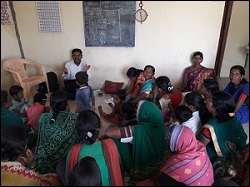Water School At Panvan
Panvan village in drought prone Maan block of Satara, has severe shortage of drinking and farming water. As a result there are no livelihood resources in the village. 60% of the people have migrated to work as the brick kiln workers, the sugarcane workers, the drivers, the painters in cities like Sangli, Kolhapur, Satara, Mumbai and Pune. The migration has caused many social issues related to children’s education, women’s health, child marriage etc. It is affecting and disrupting the whole lives of affected people.

Due to the drought situation, women are mostly affected. Some women have been permanently disabled and some have even lost their lives. On 26th Feb 2019 an event called “Water School” was organised in order to create awareness among women of Panvan village on saving water and to increase their involvement in the water management program. To start with, the participants introduced themselves and an agenda of the program was shared with them. The participant women were insistent on only one thing i.e. to remove the water scarcity from their village and enough water be available to the people. The following films were screened for the participants : A film by GSDA, Government of Maharashtra, a film on Partavadi village, a film on the lives of sugarcane laborers and a film by Lead India. A discussion followed, the screening of the above films wherein women started talking about structures and water streams underneath the soil. Many expressed a desire to work for their village like the people of Partavadi who worked hard to make water available to the village. They seemed confident that they can resolve the water issue of Panvan village. The participants learnt from Lead India film that once we start from ourselves, we can overcome a challenge however big it is. A boy in the film takes initiative in removing a tree lying in the middle of the road while police, political leader and spectators were indifferent. It was not possible for the boy to remove the tree on his own but as he made a start, the other came forward. All participants confidently expressed their wish to resolve the water issue in the same way i.e. by taking a lead themselves.
In the second session, the participants were given information about Employment Guarantee Act and its benefit and significance through a powerpoint presentation followed by an interactive discussion. They were updated on various schemes of water conservation and how to access them.
Women were informed about optimum use and reuse of water like growing kitchen gardens with used water etc. They can be a good resource for daily requirement of nutritious vegetables where we can avoid chemical fertilizers. As a result of this awareness, 35 people developed kitchen gardens in their house premises. They are using water optimally. The people have also participated in the competition by Paani Foundation to get their village rewarded for making it water rich.
The water school programme reached its conclusion with a game called “Passing the water” wherein you have to pass the water from one place to another without losing it on the way. All women participated in the game enthusiastically and learnt the significance of saving the water. They realized that their great grandparents saw flowing water streams but their grandparents saw water in wells only while their parents saw water in borewells and now they themselves see it in water bottles. With each generation water level reduced drastically. Here they got convinced of saving each drop of water if they wanted to see water in future. The Water School made the women aware and motivated enough to take immediate actions to save water for their village.
